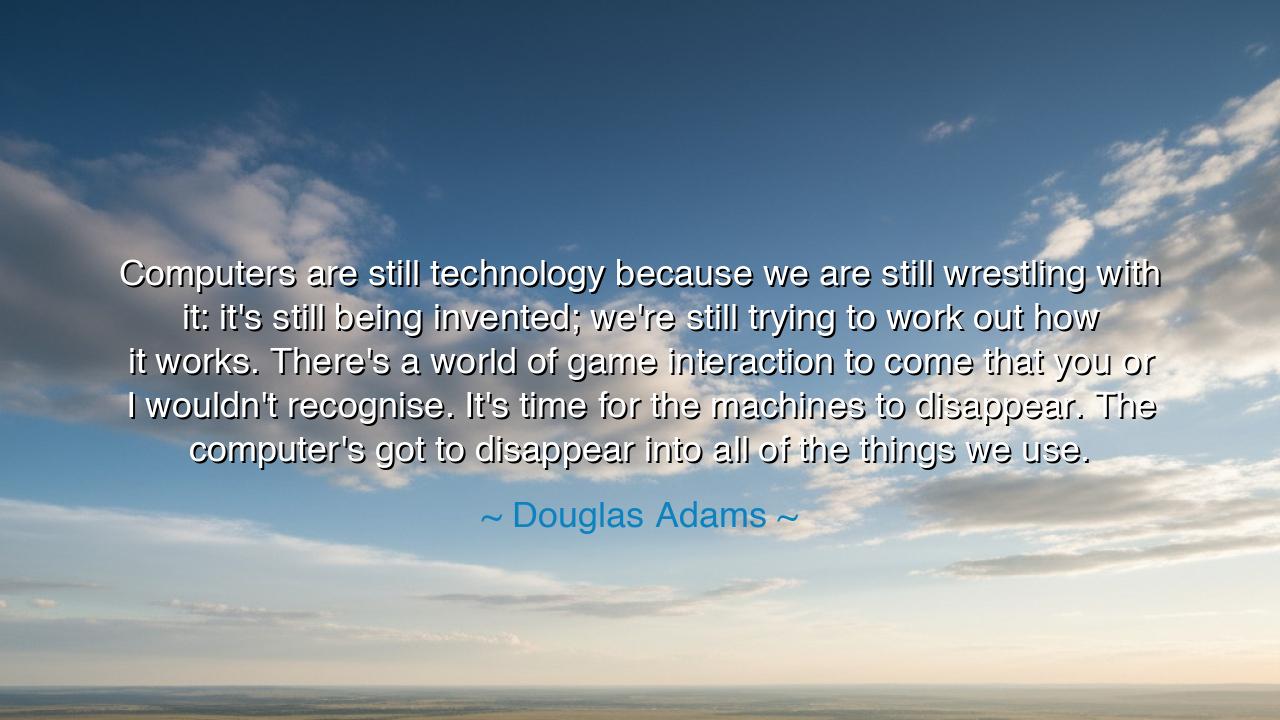
Computers are still technology because we are still wrestling
Computers are still technology because we are still wrestling with it: it's still being invented; we're still trying to work out how it works. There's a world of game interaction to come that you or I wouldn't recognise. It's time for the machines to disappear. The computer's got to disappear into all of the things we use.






In the days of old, when the great minds of the world gazed upon the stars and wondered what lay beyond, they were driven by a singular pursuit—the desire for understanding. From the earliest philosophers to the mighty inventors of the Renaissance, humanity has constantly sought to unlock the mysteries of the universe. Yet, just as the ancient sages faced challenges in deciphering the natural world, so too do we face the task of understanding the technology we have created. Douglas Adams, a visionary for the modern age, spoke of this very struggle when he said, "Computers are still technology because we are still wrestling with it: it's still being invented; we're still trying to work out how it works." His words remind us that, for all our progress, we are still in the early stages of understanding the profound potential and limitations of computers.
Adams, a philosopher of the digital era, acknowledged that the computer—that magnificent creation of circuits and codes—was not yet a settled thing. It is still a tool of the mind, constantly evolving, not yet fully grasped by those who use it. Just as the wheel was once a mysterious invention, its purpose not fully realized until centuries later, so too is the computer a tool in the process of being shaped and understood. The sages of the past never saw the wonders of the digital world, and yet, in their day, they too wrestled with the tools that would one day change history. The computer represents the latest chapter in a long story of human curiosity—a tale that has not yet reached its conclusion, but one in which we are still actively engaged.
Adams also spoke of a time when the machine itself would vanish, a time when its very presence would fade into the background of everyday life. "The computer's got to disappear into all of the things we use." This vision harkens back to the earliest inventions—the sword, the plow, the fire—which, once marvels in their own right, eventually became so embedded in daily life that their presence was no longer questioned. Imagine, if you will, the first fire used by primitive man. At first, it was an overwhelming force, both terrifying and magnificent. Yet, over time, it became a mere tool—integrated into the daily rhythm of life. The same fate awaits the computer. One day, it will no longer be a separate entity, a device to be studied or marveled at. It will become so ubiquitous, so integrated into every facet of existence, that it will be as invisible as the air we breathe.
There is wisdom in this vision, for it calls us to see the world not as it is now, but as it will be—a world where technology is not a barrier between us and life, but a seamless part of it. The great philosophers of old spoke of harmony with nature, of finding balance between man and the world around him. Similarly, Adams’s words suggest that the future of computing will be one of integration, where the computer ceases to be a separate tool and instead becomes a natural extension of our lives. We will not need to "wrestle" with it, for it will become as instinctive as the tools that have preceded it.
To understand this more clearly, let us consider the story of Leonardo da Vinci, the great polymath who foresaw the future of machines centuries before the first engine was built. His sketches of flying machines, weapons of war, and mechanical inventions were far ahead of his time. Yet, even Leonardo knew that true progress lay not in the creation of isolated inventions, but in the integration of those inventions into the fabric of life. He imagined a world where machines would serve humanity, not as separate forces, but as partners in the pursuit of knowledge and art. In many ways, computers are the culmination of this vision—a tool that can amplify the human experience if used wisely.
The lesson Adams imparts is a call to patience and vision. Just as the great civilizations of the past took time to shape their tools and integrate them into daily life, so must we do with the computer. It is not a foreign force to be feared, but a tool to be understood, refined, and eventually absorbed into the rhythms of existence. We must be mindful of how we engage with it, remembering that technology is not an end, but a means—a means to enrich the human experience, not to dominate it. In this future, the machine will not be a separate entity but a quiet, invisible partner in the symphony of life.
The practical actions we must take, then, are clear. As we continue to evolve alongside technology, we must focus not on mastering the machine, but on integrating it into our daily lives. We must strive for a balance between innovation and humanity, ensuring that technology serves us rather than we serve it. Just as the greatest artists and thinkers of the past saw the integration of their tools into the fabric of life, so must we see the computer as a tool that enhances, not separates. The future is one of seamless integration, where technology does not overwhelm us but enriches our shared journey toward wisdom, creativity, and understanding.






AAdministratorAdministrator
Welcome, honored guests. Please leave a comment, we will respond soon